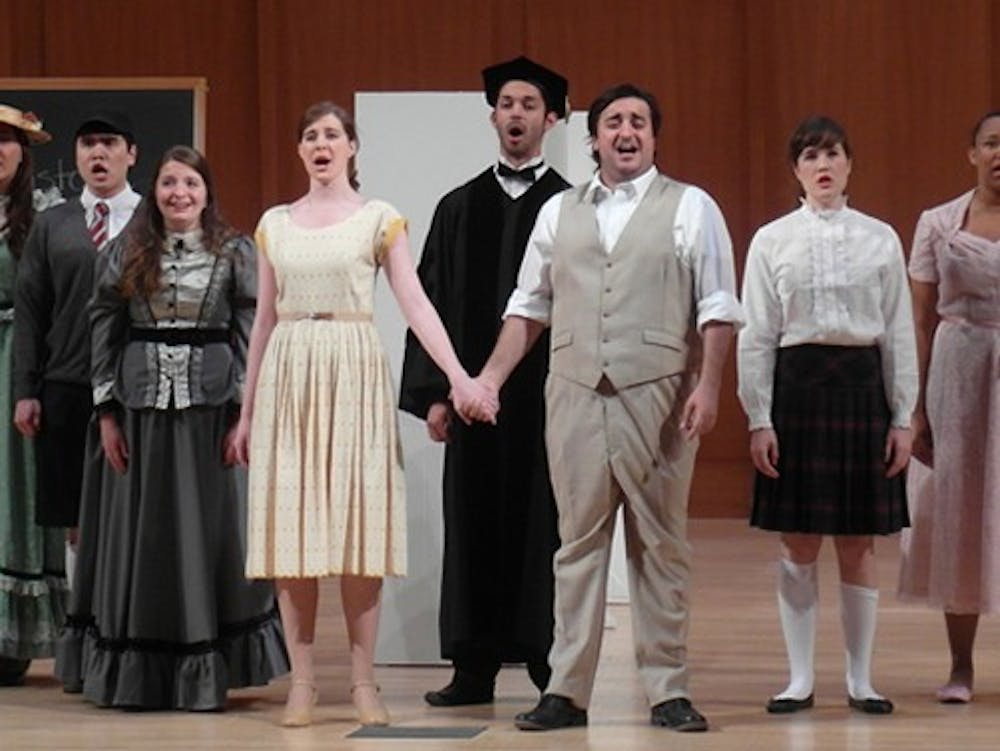There’s an expressive quality unique to the human voice that complements the dramatic elements of opera. After all, the composer Richard Wagner wrote in his 1851 essay “Oper und Drama,” “The oldest, truest, most beautiful organ of music, the origin to which alone our music owes its being, is the human voice.”
In the wake of this sentiment, it’s clear why opera has endured as an art form for centuries. It celebrates the highs and lows of human experience through an amalgam of music and theater. The timeless stories of opera have been sung all over the world, and they are being sung here at Duke, too: This Saturday, Duke Opera Theater will present a selection of opera scenes by Beethoven, Bizet, Copland, Gounod and Mozart at 3 p.m. in the Nelson Music Room.
This year, Duke’s opera program is celebrating 61 years at the university. Susan Dunn, a veteran soprano and beloved vocal professor, directed the Duke Opera Workshop from 1993 until her retirement this past spring. David Heid, the ensemble’s new director, has worked with the group for over 20 years and is steering it in a new direction. He’s beginning with a name change — from Duke Opera Workshop to Duke Opera Theater. This more accurately reflects what the group really does on campus, inviting members of the community to support the ensemble’s performances even though they are not participants themselves.
“Having such a talented opera group is really rare and so many people don’t know about it,” Heid said. “Duke Opera Theater is the definitely the best-kept secret on campus.”
The students who sing in the ensemble seem to think so as well. “Opera is not ingrained in people’s minds as something to casually enjoy. It’s perceived as an archaic bit of culture,” senior and baritone Kevin Garofolo said. “But when you tell your friends that you sing opera, their minds are blown.”
Garofolo learned from his voice lessons that singing is not just about working on his voice but also on his performance. With a background in a cappella and musical theater, opera is the next step up for him — an opportunity to try something new.
This weekend’s performance is sung entirely in English so the audience can fully understand the action happening on stage. Rather than performing an opera in its entirety, the ensemble will sing snippets of multiple works, thereby introducing the audience to a variety of compositional styles and operatic cultures. This performance is different from anything the group has ever done before — students and Duke’s voice faculty will sing together in operatic ensembles, which will allow seasoned singers like Sandra Cotton, Susan Dunn, Ted Federle and Elizabeth Linnartz to teach students on stage.
“It completely changes the student-teacher relationship,” Garofolo said. “You’re not subordinate anymore, but almost like a colleague.”
“It’s fun to work with the people who are training us and have the opportunity to learn from their professionalism,” sophomore and soprano Alex Burnston said. “It’s a whole different learning experience.”
Burnston wants to pursue a career in performing arts administration, so Duke Opera Theater is a neat opportunity to perform the works she wants to manage in the future. She’s also studying opera academically by pursuing a Program II focusing on classical music traditions and their value over time. Still, her love for opera goes even deeper than that. Opera is therapeutic for her and the other students in the ensemble.
“Singing those high notes each rehearsal gives me a newfound energy,” Burnston said. “I’ll jump around genuinely restless from the rush of performing.”
Duke Opera Theater will be performing a concert of operatic ensembles Saturday at 3 p.m in the Nelson Music Room. Admission is free.
Get The Chronicle straight to your inbox
Sign up for our weekly newsletter. Cancel at any time.

